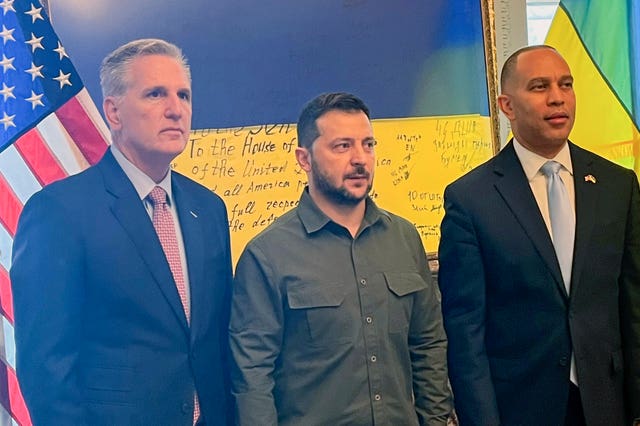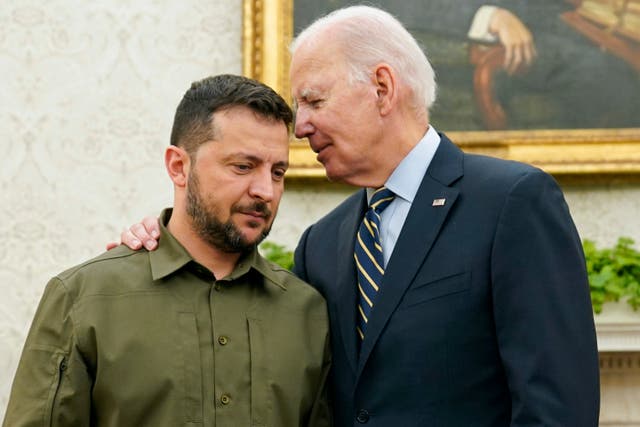‘Not much time’ to keep aid flowing to Ukraine, Biden warns Congress
The US president said there was ‘an overwhelming sense of urgency’.

US president Joe Biden has said that American aid to Ukraine will keep flowing for now as he sought to reassure allies of continued American financial support for the war effort.
But time was running out, the president said in a warning to Congress.
“We cannot under any circumstances allow American support for Ukraine to be interrupted,” Mr Biden said in remarks from the Roosevelt Room after Congress voted late on Saturday to avert a government shutdown by passing a short-term funding package that dropped assistance for Ukraine in the fight against Russia.

“We have time, not much time, and there’s an overwhelming sense of urgency,” he said, noting that the funding bill lasted only until mid-November.
Mr Biden urged Congress to negotiate an aid package as soon as possible.
“The vast majority of both parties — Democrats and Republicans, Senate and House — support helping Ukraine and the brutal aggression that is being thrust upon them by Russia,” Mr Biden said.
“Stop playing games, get this done.”
But many lawmakers acknowledge that winning approval for Ukraine assistance in Congress was growing more difficult as the war ground on. Republican resistance to the aid has been gaining momentum in the halls of Congress.

Voting in the House this past week pointed to potential trouble ahead, with nearly half of House Republicans voting to strip 300 million US dollars (£246 million) from a defence-spending bill to train Ukrainian soldiers and purchase weapons. The money was later approved separately, but opponents of Ukraine support celebrated their growing numbers.
Then, on Saturday, House Speaker Kevin McCarthy omitted additional Ukraine aid from a measure to keep the government running until November 17. In doing so, the Republican closed the door on a Senate package that would have funneled six billion US dollars (£4.9 billion) to Ukraine, roughly a third of what had been requested by the White House.
Both the House and Senate overwhelmingly approved the stopgap measure, with members of both parties abandoning the increased aid for Ukraine in favour of avoiding a costly government shutdown.
Mr Biden said that deal was made to keep the government running and he worked to reassure US allies that the funding would be there.
“Look at me,” he said turning his face to the cameras at the White House. “We’re going to get it done. I can’t believe those who voted for supporting Ukraine – overwhelming majority in the House and Senate, Democrat and Republican – will for pure political reasons let more people die needlessly in Ukraine.”
The latest actions in Congress signal a gradual shift in the unwavering support that the United States has so far pledged Ukraine in its fight against Russia, and it is one of the clearest examples yet of the Republican Party’s movement toward a more isolationist stance.
The exclusion of Ukraine funding came little more than a week after lawmakers met in the Capitol with Ukrainian president Volodymyr Zelensky, who sought to assure lawmakers that his military was winning the war, but stressed that additional aid would be crucial for continuing the fight.
After that visit, Senate Majority Leader Chuck Schumer, said that one sentence summed up Mr Zelensky’s message in his meeting with the Senate: “If we don’t get the aid, we will lose the war.”
Yet, Mr McCarthy, pressured by his right flank, has gone from saying “no blank cheques” for Ukraine, with the focus being on accountability, to describing the Senate’s approach as putting “Ukraine in front of America”.
He declined to say after the vote on government funding whether he would bring aid for Ukraine up for a House vote in the coming weeks.
“If there is a moment in time we need to have a discussion about that, we will have a discussion completely about that, but I think the administration has to make the case for what is victory,” Mr McCarthy said.
Mr Biden said in a statement after Congress averted a shutdown that “we cannot under any circumstances allow American support for Ukraine to be interrupted”.
He called on Mr McCarthy to “keep his commitment to the people of Ukraine” and push through “the support needed to help Ukraine at this critical moment”.
In the Senate, both Mr Schumer and Senate Republican leader Mitch McConnell pledged to move quickly to try and pass the full White House request. But it was clear that goal would be increasingly difficult as more rank-and-file Republican senators have questioned the aid or demanded that it be attached to immigration policy that would help secure the southern border — echoing similar demands in the House.
Florida Senator Rick Scott, a Republican who voted for the spending bill after the Ukraine aid was stripped out, said that Congress needed to have “a conversation with the American public”. He said he was optimistic after seeing the money taken out of the bill.
“In my state, people want to be helpful to Ukraine, but they also want to be helpful to Americans,” Mr Scott said.
“And so they want to really understand how this money has been spent.”

Democrats said they were disappointed by the lack of Ukraine funding, but expressed determination that they would get the aid to the war-torn country.
“We will not stop fighting for more economic and security assistance for Ukraine,” Mr Schumer said after the bill passed.
“Majorities in both parties support Ukraine aid, and doing more is vital for America’s security and for democracy around the world.”
The US has approved four rounds of aid to Ukraine in response to Russia’s invasion, totalling about 113 billion US dollars (£93 billion), with some of that money going towards replenishment of US military equipment that was sent to the front lines. In August, Mr Biden called on Congress to provide for an additional 24 billion US dollars (£20 billion).





